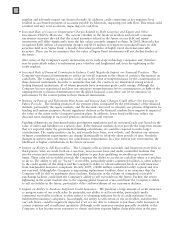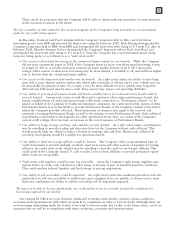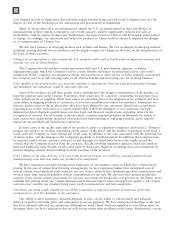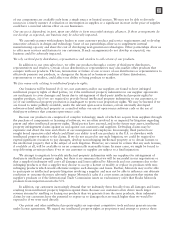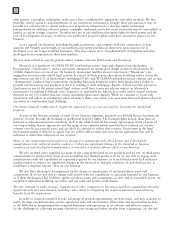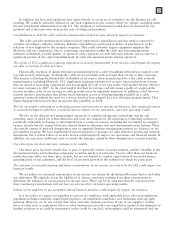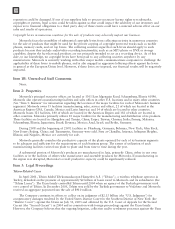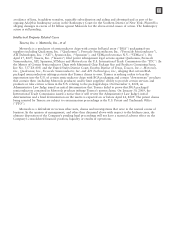Motorola 2008 Annual Report Download - page 38
Download and view the complete annual report
Please find page 38 of the 2008 Motorola annual report below. You can navigate through the pages in the report by either clicking on the pages listed below, or by using the keyword search tool below to find specific information within the annual report.
reputation could be damaged. If one of our suppliers fails to procure necessary license rights to trademarks,
copyrights or patents, legal action could be taken against us that could impact the salability of our inventory and
expose us to financial obligations to a third party. Any of these events could have a material adverse effect on our
sales and results of operations.
Copyright levies in numerous countries for the sale of products may adversely impact our business.
Motorola faces the possibility of substantial copyright levies from collecting societies in numerous countries
for the sale of products that might be used for the private copying of copyright protected works such as mobile
phones, memory cards, and set top boxes. The collecting societies argue that such levies should apply to such
products because they include audio/video recording functionality, such as an MP3 player or DVR or storage
capability, despite the fact that such products are not primarily intended to act as a recording device. As of this
date, to our knowledge, no copyright levies have been paid to any collecting societies anywhere by any
manufacturer. Motorola is currently working with other major mobile communications companies to challenge the
applicability of these levies to mobile phones, and is also engaged in aggressive lobbying efforts against the levies
in general at the European Union level. However, if these levies are imposed, our financial results will be negatively
impacted.
Item 1B: Unresolved Staff Comments
None.
Item 2: Properties
Motorola’s principal executive offices are located at 1303 East Algonquin Road, Schaumburg, Illinois 60196.
Motorola also operates manufacturing facilities and sales offices in other U.S. locations and in many other countries.
(See “Item 1: Business” for information regarding the location of the major facilities for each of Motorola’s business
segments.) Motorola owns 35 facilities (manufacturing, sales, service and office), 21 of which are located in the
Americas Region (USA, Canada, Mexico and Latin America) and 14 of which are located in other countries.
Motorola leases 321 facilities, 140 of which are located in the Americas Region and 181 of which are located in
other countries. Motorola primarily utilizes 10 major facilities for the manufacturing and distribution of its products.
These facilities are located in: Hangzhou and Tianjin, China; Taipei, Taiwan; Chennai, India; Penang, Malaysia;
Schaumburg, Illinois; Jaguariuna, Brazil; Reynosa, Mexico; Arad, Israel; and Berlin, Germany.
During 2008 and the beginning of 2009, facilities in: Flensburg, Germany; Bohemia, New York; Glen Rock,
New Jersey; Beijing, China; and Taunesstein, Germany were sold. Sites at Chandler, Arizona; Arlington Heights,
Illinois; and Nogales, Mexico are currently for sale.
Motorola generally considers the productive capacity of the plants operated by each of its business segments
to be adequate and sufficient for the requirements of each business group. The extent of utilization of such
manufacturing facilities varies from plant to plant and from time to time during the year.
A substantial portion of Motorola’s products are manufactured in Asia, primarily China, either in our own
facilities or in the facilities of others who manufacture and assemble products for Motorola. If manufacturing in
the region was disrupted, Motorola’s overall productive capacity could be significantly reduced.
Item 3: Legal Proceedings
Telsim-Related Cases
In April 2001, Telsim Mobil Telekomunikasyon Hizmetleri A.S. (“Telsim”), a wireless telephone operator in
Turkey, defaulted on the payment of approximately $2 billion of loans owed to Motorola and its subsidiaries (the
“Telsim Loans”). The Uzan family controlled Telsim until 2004 when an agency of the Turkish government took
over control of Telsim. In December 2005, Telsim was sold by the Turkish government to Vodafone and Motorola
received an aggregate payment from the sale of $910 million.
The Company continues its efforts to collect on its judgment of $2.13 billion (the “U.S. Judgment”) for
compensatory damages rendered by the United States District Court for the Southern District of New York (the
“District Court”) against the Uzans on July 31, 2003 and affirmed by the U.S. Court of Appeals for the Second
Circuit (the “Second Circuit”) in 2004 and in connection with foreign proceedings against the Uzan family.
However, the Company believes that the ongoing litigation, collection and/or settlement processes against the Uzan
30


